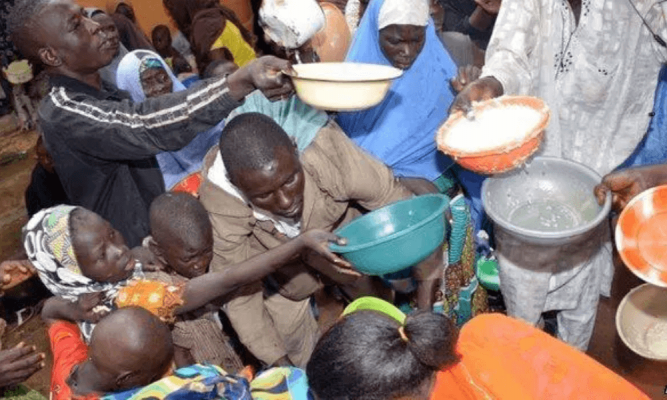About 34.7 million Nigerians may face a food crisis or worse levels of hunger between June and August 2026, a United Nations report has said.
According to the report, the figure includes internally displaced persons (IDPs) in 27 states and the Federal Capital Territory (FCT).
The report noted that approximately 650,730 IDPs in Borno, Sokoto, and Zamfara states are among those most affected.
The analysis, which projects worsening food insecurity conditions, warns that over 27.2 million Nigerians across 27 states and the FCT are already facing severe food insecurity as of late 2025. The figure is expected to rise to 34.7 million by mid-2026 without urgent intervention. According to the United Nations, this situation is driven by insecurity, climate shocks, displacement from conflict and disasters, as well as prolonged dry spells and flooding.
On food consumption, the report highlights that more than 55 per cent of households who managed to maintain acceptable food consumption levels did so by eating lower-quality meals and reducing meal portions for both children and adults. Many families also borrowed money to buy food. Although inflation and the consumer price index (CPI) rate declined during the period, the cost of essential food items such as vegetable oils, dairy products, meat, and condiments increased by over 35 per cent due to the naira-dollar exchange rate.
The United Nations stated that “the high cost of services, particularly in food transportation, further contributed to increased prices and higher household spending.” It warned that between June and August 2026, rising inflation and poor access to affordable food could worsen food consumption outcomes across affected regions.
The report also sheds light on the evolution of livelihoods across Nigeria, particularly in rural areas. It explains that many farmers faced reduced access to farmlands due to insecurity and difficult terrains. The report added that “the high naira-dollar exchange rate has driven up import costs for manufactured goods and raw materials, fueling inflation and increasing operational costs for businesses.”
In the agricultural sector, the government’s food imports benefited consumers but negatively affected local farmers, many of whom incurred losses despite heavy investments during the 2025 cropping season. The UN further noted a 56 per cent rise in the cost of energy, fertilizers, and agrochemicals, discouraging farmers from participating in the 2025/26 dry season farming campaign. As the lean season approaches, several local government areas are expected to experience further declines in livelihoods, especially in regions already suffering from insecurity.
On nutrition, the report points to serious and critical levels of malnutrition across parts of the North West, North East, and North Central states. It revealed that “nutrition levels range from Alert (Phase 2) to Serious (Phase 3), and to Critical (Phase 4) in many areas.” Critical malnutrition (Phase 4) was recorded in several parts of Borno and Yobe states, while Katsina, Jigawa, and Benue States also reported alarming levels. In Borno, the report identified Central Borno, Maiduguri, Jere, and Mobbar as among the hardest hit.
Regarding mortality, the UN report indicates that while most areas in the Northeast and Northwest currently experience low mortality rates (Phase 1 and 2), several locations are facing crisis-level mortality (Phase 3). These include parts of Borno, Adamawa, Yobe, Sokoto, Katsina, Zamfara, Kebbi, and Jigawa states. Emergency-level mortality (Phase 4) has been reported in Eastern Borno and Northern Adamawa.
The United Nations concluded by calling for immediate action to prevent acute food and nutrition insecurity, stressing that without intervention, millions more Nigerians could face worsening hunger and malnutrition in the coming year.

